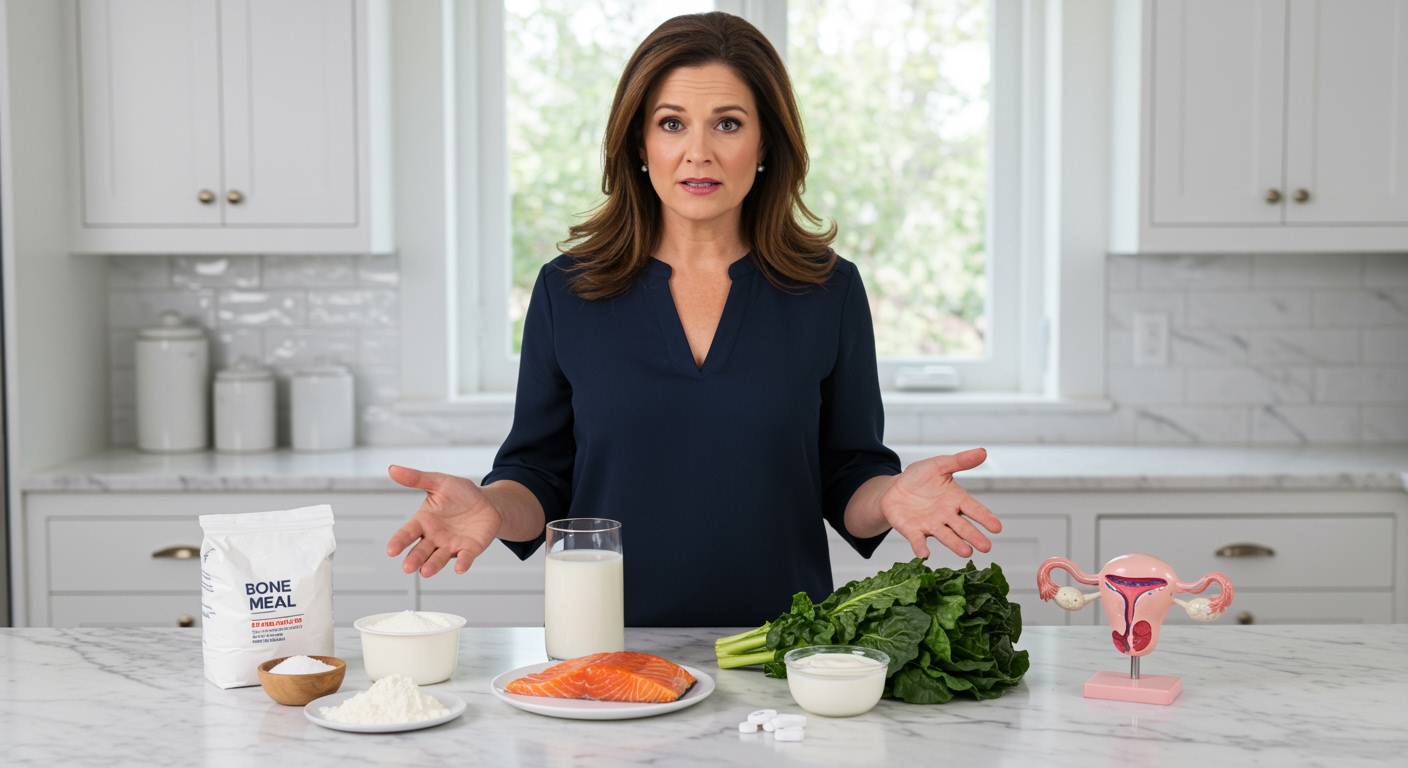✪ Key Takeaway: Bone meal carries contamination risks and lacks hormonal benefits that PCOS women need from safer calcium sources.
Introduction
You walk down the supplement aisle and see bone meal marketed as a natural calcium source.
With PCOS affecting your bone health and calcium absorption, you wonder if this ancient remedy could solve your mineral needs.
Hi, I’m Abdur, your nutrition coach and today I’m going to explain why bone meal might not be the safest choice for PCOS calcium needs.
What Makes Bone Meal Different From Other Calcium Sources?
Bone meal comes from ground animal bones that have been processed into a fine powder.
This supplement contains calcium phosphate along with trace amounts of other minerals found naturally in bone tissue.
Unlike synthetic calcium carbonate, bone meal provides calcium in its natural matrix with phosphorus and small amounts of magnesium.
The calcium content typically ranges from 20-24% by weight, making it a concentrated source of this essential mineral.
However, the bioavailability of calcium from bone meal varies significantly depending on processing methods and individual digestive health.
Your stomach acid levels play a crucial role in breaking down the calcium phosphate compounds for proper absorption.
PCOS women often experience digestive issues that can further reduce absorption rates compared to other calcium forms.
✪ Fact: Bone meal contains only 20-24% calcium compared to 40% in calcium carbonate supplements.
Why Do PCOS Women Need Extra Calcium Attention?
PCOS creates a perfect storm of factors that increase your calcium requirements beyond normal levels.
Insulin resistance, a hallmark of PCOS, interferes with calcium absorption in your intestines through multiple pathways.
High insulin levels trigger increased calcium excretion through your kidneys, creating a constant drain on your body stores.
Chronic inflammation associated with PCOS further impairs calcium utilization at the cellular level.
Many PCOS women also have vitamin D deficiency, which dramatically reduces calcium absorption regardless of intake amounts.
The hormonal imbalances in PCOS affect parathyroid hormone regulation, disrupting normal calcium homeostasis.
Research shows PCOS women have significantly lower bone mineral density compared to healthy women of the same age.
✪ Pro Tip: Get your vitamin D levels tested before starting any calcium supplement for optimal absorption.
What Are The Hidden Risks Of Bone Meal Supplements?
The biggest concern with bone meal supplements lies in potential heavy metal contamination from the source animals.
Lead, mercury, and cadmium accumulate in animal bones throughout their lifetime, especially in older animals used for processing.
Studies have found concerning levels of lead contamination in many commercially available bone meal products.
PCOS women are particularly vulnerable to heavy metal toxicity because these metals can worsen insulin resistance and hormonal imbalances.
The processing methods used to create bone meal often fail to remove these toxic substances effectively.
Unlike pharmaceutical-grade calcium supplements, bone meal products face less stringent testing and quality control standards.
The inconsistent quality between batches makes it impossible to guarantee safe consumption over long periods.
✪ Note: Heavy metals in bone meal can accumulate in your body and worsen PCOS symptoms over time.
Which Calcium Sources Work Better For PCOS Management?
Calcium citrate stands out as the most PCOS-friendly option because it absorbs well even with low stomach acid.
This form requires less digestive processing and works effectively regardless of meal timing or stomach pH levels.
Food sources like leafy greens, sardines, and sesame seeds provide calcium alongside other beneficial nutrients for hormone balance.
Dairy products offer calcium with protein and vitamin D, but choose organic options to avoid hormone-disrupting additives.
Calcium magnesium combinations work particularly well for PCOS because magnesium helps improve insulin sensitivity.
The ideal ratio is 2:1 calcium to magnesium, which supports both bone health and hormonal regulation.
Always take calcium supplements with vitamin D3 to maximize absorption and support overall metabolic health.
✪ Pro Tip: Split calcium doses into 500mg portions throughout the day for better absorption than single large doses.
How Should You Time Calcium Intake With PCOS Medications?
Calcium can interfere with the absorption of common PCOS medications like metformin if taken simultaneously.
Take calcium supplements at least two hours apart from metformin to prevent reduced effectiveness of your diabetes medication.
Iron supplements, often needed by PCOS women, compete with calcium for absorption in your intestines.
Space these minerals at least four hours apart to ensure optimal absorption rates for both nutrients.
Thyroid medications, commonly prescribed for PCOS-related thyroid issues, require special timing considerations with calcium.
Take thyroid medication on an empty stomach first thing in the morning, then wait at least four hours before calcium intake.
Birth control pills can increase calcium absorption, so you might need lower doses if using hormonal contraception for PCOS management.
✪ Note: Always consult your healthcare provider about supplement timing with PCOS medications for safety.
The Bottom Line
Bone meal supplements pose unnecessary risks for PCOS women who need reliable, clean calcium sources for optimal health.
Your health deserves better than gambling with contaminated supplements when safer alternatives exist.
I would love to hear about your experiences with calcium supplements or any questions you have about managing PCOS through nutrition in the comments below.
References
At NutritionCrown, we use quality and credible sources to ensure our content is accurate and trustworthy. Below are the sources referenced in writing this article:
- University of Rochester Medical Center: Bone Meal
- PubMed: Calcium and PCOS Research
- PMC: Calcium Supplementation in PCOS
- PMC: PCOS and Bone Health





